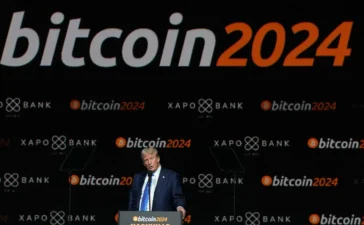Please use the sharing tools found via the share button at the top or side of articles. Copying articles to share with others is a breach of FT.comT&Cs and Copyright Policy. Email [email protected] to buy additional rights. Subscribers may share up to 10 or 20 articles per month using the gift article service. More information can be found here.
https://www.ft.com/content/78ebd5f9-dbb1-4dc6-84a8-1f8347bec535
The EU’s incoming regulations for crypto assets will allow some of the industry’s biggest players, including exchange Binance, to escape stricter supervision and need to be overhauled, a senior European Central Bank official has warned.
Elizabeth McCaul, a member of the ECB’s supervisory board, warned in a blog on Wednesday of “gaps in the framework” for regulating crypto markets and said traditional approaches to financial market oversight might not work. McCaul’s view reflects growing concern in Europe over the region’s ability to oversee the crypto industry, which has been marred by several high-profile scandals in recent months including last year’s collapse of exchange FTX.
In a challenge to Binance, the world’s largest crypto trading exchange and which claims to have no formal headquarters, McCaul said such companies posed “challenges for our current regulatory and supervisory approaches”. “No jurisdiction should allow entities to run their business without disclosing their legal status and who is responsible for the business,” she said. “Even firms that claim to have no headquarters, such as Binance, need to be ‘supervisable’.” Her comment is a further sign of mounting regulatory pressure on Binance after the US Commodity Futures Trading Commission filed a lawsuit last month against the exchange, accusing it of illegally serving US clients. The CFTC also cited internal communications that it said showed Binance knew the platform facilitated potentially illegal activities.
Binance claimed the complaint “appears to contain an incomplete recitation of facts”, adding that it did not agree with the “characterisation of many of the issues alleged in the complaint”. The CFTC’s lawsuit came two days before the Financial Times revealed Binance hid substantial ties to China for several years. The EU has drawn up an extensive set of rules, known as the Markets in Crypto Assets (Mica) regulation, due to come into force in 2024. McCaul said she was proud the EU was “taking the first steps globally to provide for oversight of the crypto world”.
Mica will bolster governance, segregation of customer funds and external audit requirements, she said, while warning “certain areas still need further strengthening”. For crypto asset service providers to be considered significant under Mica and therefore supervised by the European Banking Authority in co-operation with the ECB, they must have at least 15mn active users in Europe — a threshold McCaul said was likely to miss Binance and FTX, before its collapse. Smaller crypto providers will be supervised by national EU authorities. She suggested the threshold be adjusted to account for different business types and be measured “at group level rather than an individual entity level”.
Stricter rules and enhanced supervision should apply to crypto groups classed as significant, which they do not under Mica, she added. Crypto groups often have opaque structures criss-crossing many national borders. McCaul said regulators needed to supervise them at a group level to identify conflicts of interest and “opportunities for regulatory arbitrage”. Her concerns build on those already expressed by other top European regulators. The ECB’s chair of supervision Andrea Enria had warned that crypto platforms posed a “huge consumer protection issue” because they did not respect national borders.
EBA chair José Manuel Campa praised Mica but admitted there were blind spots in the package. Binance is also seeking to convince US regulators to greenlight a deal that would allow Binance US, the company’s US affiliate, to purchase the assets of Voyager Digital, a crypto company that went bankrupt last year. The deal is under review by the Committee on Foreign Investment in the United States, a government agency that determines if overseas investments present national security risks. Binance said in a statement: “Over the years, Binance has been vocal about the need for effective and appropriate regulation. Mica is a welcome and pragmatic step in the right direction on this, harmonizing requirements across the EU and creating a single market for crypto.”
Original source: https://www.ft.com/content/78ebd5f9-dbb1-4dc6-84a8-1f8347bec535














